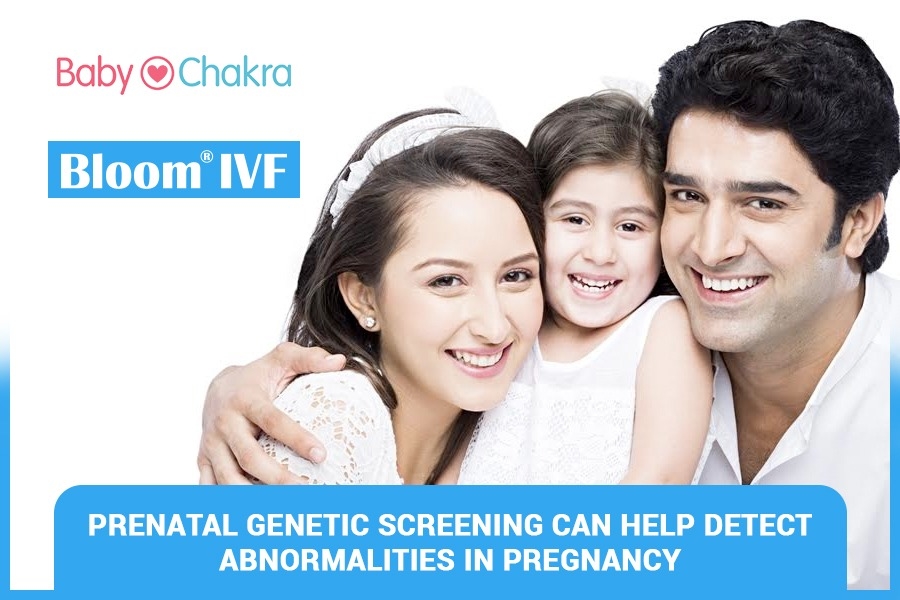
Chromosome And Genetic Testing During Pregnancy – Do You Need It?
20 Mar 2021 | 4 min Read
Medically reviewed by
Author | Articles
Every parent-to-be wishes to have an uneventful pregnancy and a healthy child. During the duration of a pregnancy, a mother-to-be is advised to undergo regular antenatal checkups and screening to monitor the growth and development of the baby and to optimise prenatal care.1
In addition to the physical examination and routine parameters, your doctor might recommend that you undergo genetic screening.1 Genetic screening and diagnostics can help diagnose the potential for certain genetic disorders before birth.1
Many genetic abnormalities can be detected with genetic testing during pregnancy. Some of them are:
Chromosomal abnormalities such as Down’s Syndrome2
Cystic fibrosis1
Muscular dystrophy1
Hemophilia A1
Polycystic kidney disease1
Sickle cell disease.1
Thalassemia1
Screening and Prevention of Down’s Syndrome in Your Child
The Down Syndrome can be prevented by 2 methods:
One is the standard method where you can do genetic screening of the pregnant woman either in the 1st 3 months or next 3 months of pregnancy. In the first 3 months, traditionally you can do the dual marker blood test in combination with the sonographic examination of the baby’s nuchal thickness at 11 weeks. However, nowadays instead of doing Dual Marker Blood test, you can do Non Invasive Prenatal Test (NIPT) on the blood of the mother from 10th (2.5-months) to 20th (5-months) weeks of pregnancy.
In the second trimester (4th, 5th month of pregnancy), you can screen for Down’s Syndrome by doing a screening on the mother’s blood called the Quadruple Marker Test in association with the ultrasound examination of the baby at 18 weeks of pregnancy (4.5-months). You may also do an NIPT test on mother’s blood as mentioned previously.
If the Dual Marker, NT scan, Quadruple Marker, NIPT comes positive then confirmation of Down’s Syndrome is done by doing the genetic testing by karyotype method on the tissue obtained by chorion villus sampling or amniocentesis.
Genetic testing for conception through IVF
For couples undergoing In Vitro Fertilization (IVF) treatment to conceive, preimplantation genetic testing technique is used to identify genetic defects in the embryos itself before implantation. The decision to opt for a prenatal genetic test is upto the parents. Some couples would want to prevent that their baby is born with a genetic disorder. It is recommended by the doctors in certain couples.
Specifically, Preimplantation genetic testing PGT-M refers specifically to when one or both genetic parents has a known genetic abnormality and testing is performed on an embryo to determine if it also carries a genetic abnormality. In contrast, preimplantation genetic testing PGT-A refers to techniques where embryos from presumed chromosomally normal genetic parents are screened for aneuploidy5 – a category of chromosomal mutations in which the chromosome number is abnormal.6
Expanded Carrier Screening (ECS)
Expanded Carrier Screening (ECS) would help identify couples at risk of genetic disease, who can pass defective genes to their offspring. Normally this is done by screening the husband and wife or sperm/egg donors in case of couples undergoing IVF with egg or sperm donor. ECS consists of testing for a panel of 300 plus important genes responsible for monogenic disorders (sickle cell, thalassemia, cystic fibrosis etc.) using NGS technology along with PCR testing for Fragile X syndrome and Muscular Dystrophy (SMA + DMD). Those who are at risk, can be offered pre implantation genetic testing for monogenic disorders called PGT-M or prenatal testing using CVS/amniocentesis. Nowadays many newly-wed couples are undergoing this preventive test before planning for their first child, thus totally eliminating the risk of having a genetically affected child, in their life.
To undergo a successful screening or testing of embryos, a well-equipped laboratory with the latest technology is necessary to provide accurate results. On World Down Syndrome Day, Bloom IVF – an award-winning chain of fertility clinics in India has launched BAUFICI Genetics Laboratory, an in-house lab with advanced state-of-the-art facilities to support successful IVF treatments.
For more information, you can log-on to www.baufici.com
Please note that disclosure of sex is prohibited by law and not done here.

References:
1. https://www.hopkinsmedicine.org/health/wellness-and-prevention/common-tests-during-pregnancy#:~:text=Prenatal%20Screening%20Tests-,First%20trimester%20screening%20is%20a%20combination%20of%20fetal%20ultrasound%20and,alone%20or%20with%20other%20tests.
2. https://www.cdc.gov/ncbddd/birthdefects/diagnosis.html
3. https://www.acog.org/womens-health/faqs/prenatal-genetic-screening-tests
4. https://www.stanfordchildrens.org/en/topic/default?id=pregnancy-over-age-30-90-P02481
5. https://www.ncbi.nlm.nih.gov/pmc/articles/PMC4355257/
6. https://emedicine.medscape.com/article/273415-overview
7. https://www.ncbi.nlm.nih.gov/books/NBK21870/
A


Related Topics for you
Suggestions offered by doctors on BabyChakra are of advisory nature i.e., for educational and informational purposes only. Content posted on, created for, or compiled by BabyChakra is not intended or designed to replace your doctor's independent judgment about any symptom, condition, or the appropriateness or risks of a procedure or treatment for a given person.
